LML6001 Migration Law: Letter of Advice and Exceptional Circumstances
VerifiedAdded on 2022/11/13
|7
|1597
|112
Report
AI Summary
This report provides a detailed letter of advice concerning a migration law case, specifically addressing the concept of "exceptional circumstances" as it relates to visa applications under Australian migration law. It analyzes the case, referencing relevant legislation including the Migration Act 1958 and Migration Regulations 1994, and judicial precedents such as Hatcher v Cohn, Wang v Minister of Immigration, and Yassa (Migration). The advice explores the policy considerations, principles of statutory interpretation (particularly the literal rule), and the use of extrinsic materials in determining the outcome of the application. The report explains why the application for an extension was unsuccessful, emphasizing the failure to satisfy the requirements for exceptional circumstances. It concludes by suggesting the applicant explore a medical visa and provides a bibliography of cited sources.
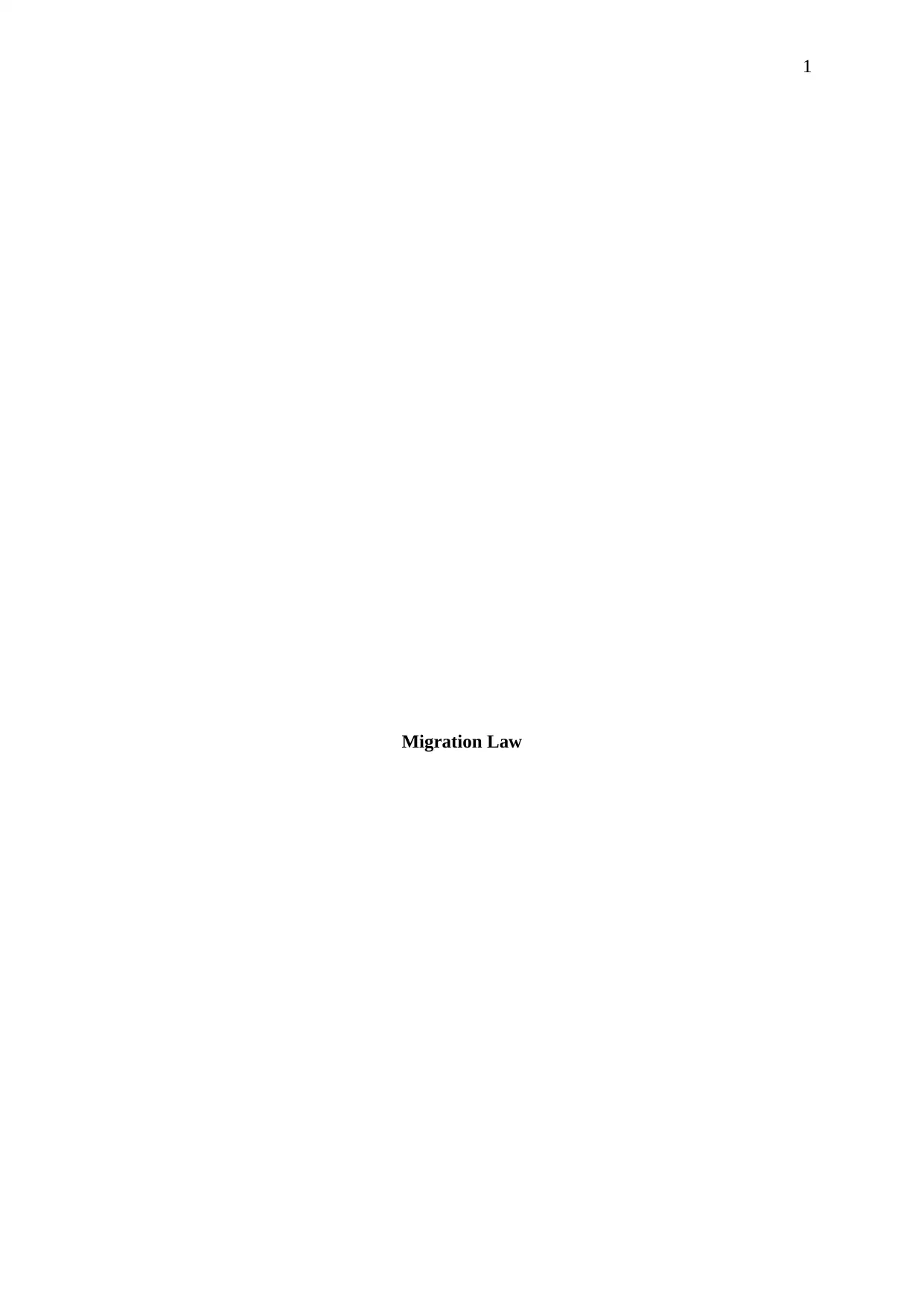
1
Migration Law
Migration Law
Paraphrase This Document
Need a fresh take? Get an instant paraphrase of this document with our AI Paraphraser
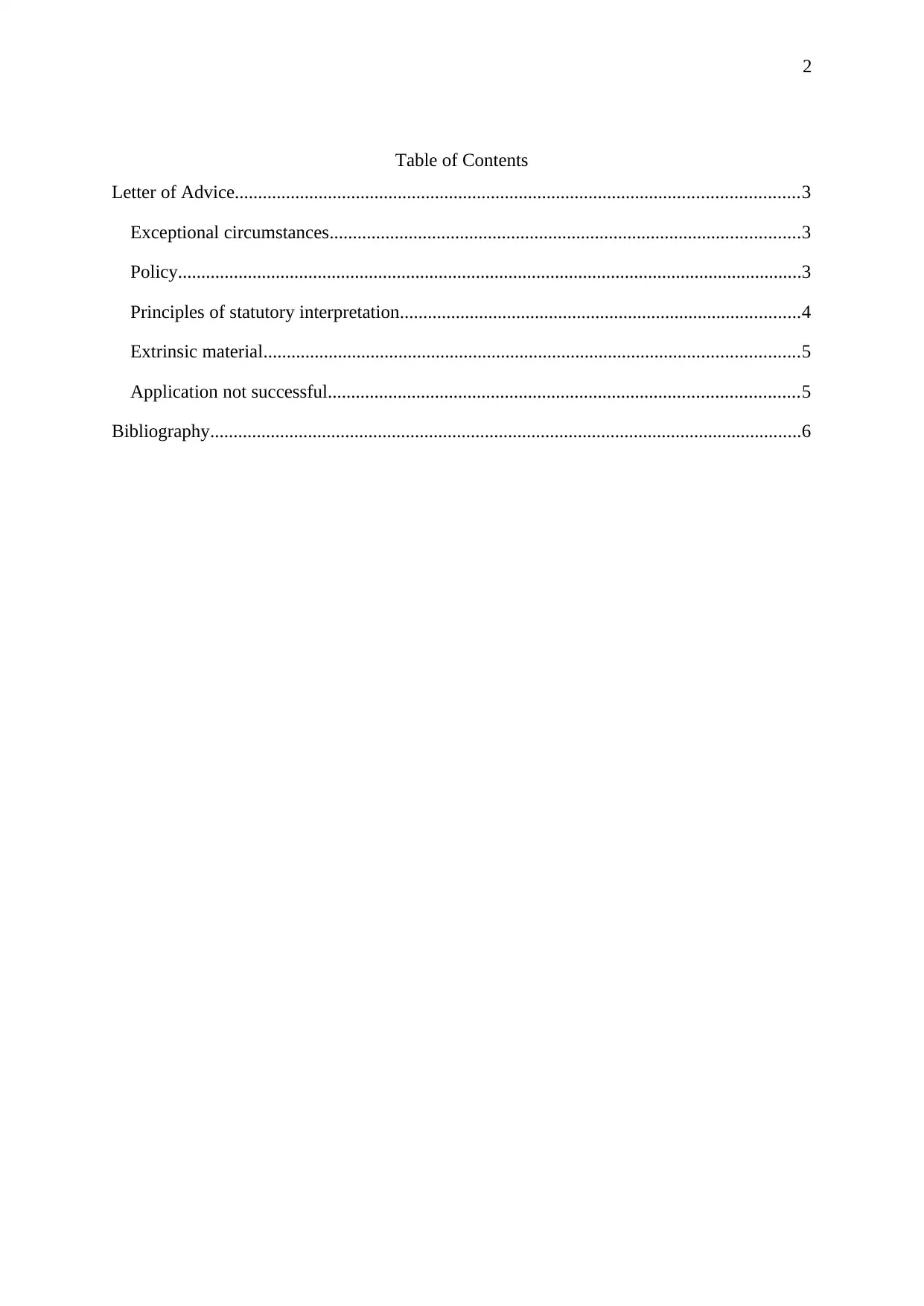
2
Table of Contents
Letter of Advice.........................................................................................................................3
Exceptional circumstances.....................................................................................................3
Policy......................................................................................................................................3
Principles of statutory interpretation......................................................................................4
Extrinsic material...................................................................................................................5
Application not successful.....................................................................................................5
Bibliography...............................................................................................................................6
Table of Contents
Letter of Advice.........................................................................................................................3
Exceptional circumstances.....................................................................................................3
Policy......................................................................................................................................3
Principles of statutory interpretation......................................................................................4
Extrinsic material...................................................................................................................5
Application not successful.....................................................................................................5
Bibliography...............................................................................................................................6
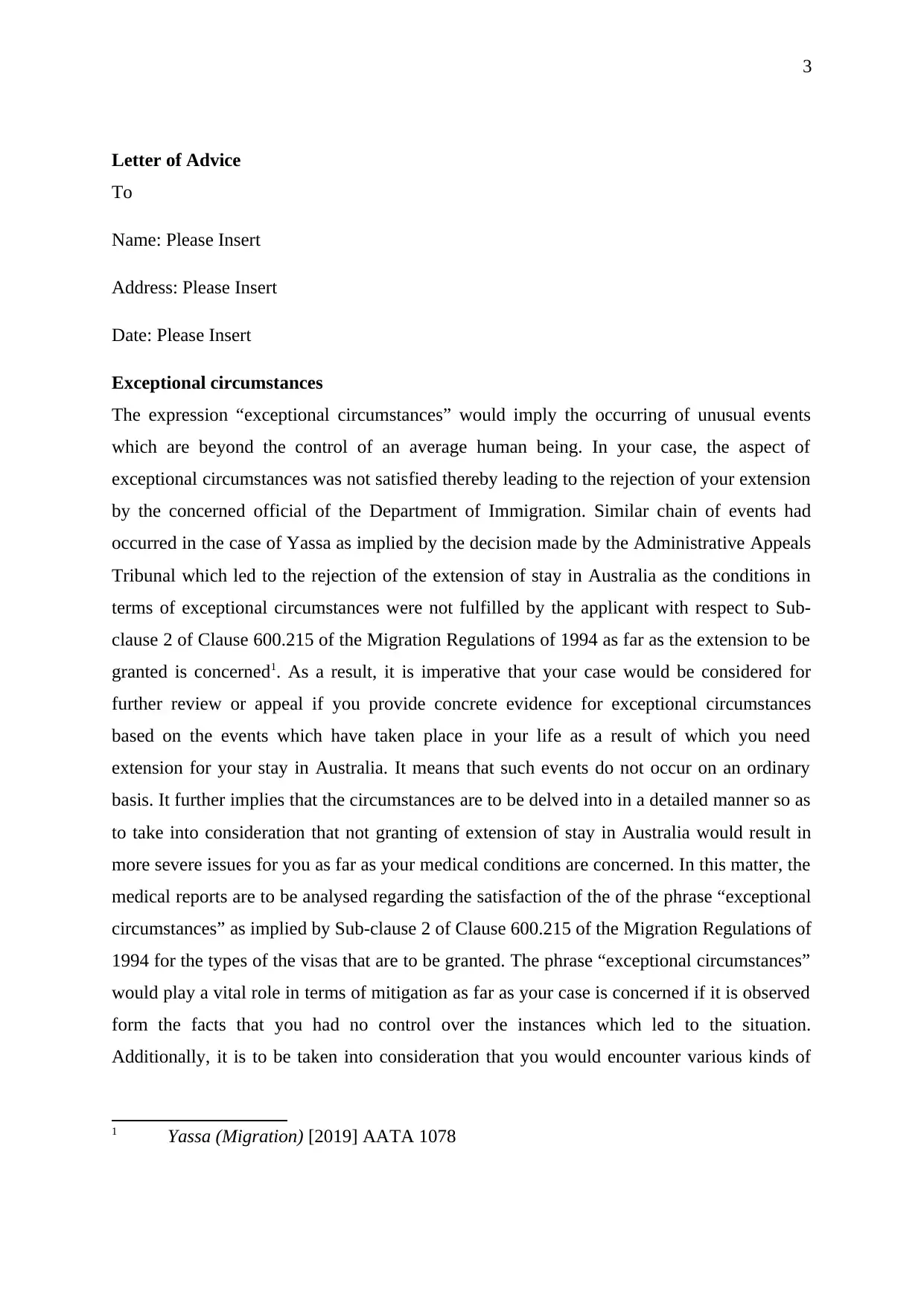
3
Letter of Advice
To
Name: Please Insert
Address: Please Insert
Date: Please Insert
Exceptional circumstances
The expression “exceptional circumstances” would imply the occurring of unusual events
which are beyond the control of an average human being. In your case, the aspect of
exceptional circumstances was not satisfied thereby leading to the rejection of your extension
by the concerned official of the Department of Immigration. Similar chain of events had
occurred in the case of Yassa as implied by the decision made by the Administrative Appeals
Tribunal which led to the rejection of the extension of stay in Australia as the conditions in
terms of exceptional circumstances were not fulfilled by the applicant with respect to Sub-
clause 2 of Clause 600.215 of the Migration Regulations of 1994 as far as the extension to be
granted is concerned1. As a result, it is imperative that your case would be considered for
further review or appeal if you provide concrete evidence for exceptional circumstances
based on the events which have taken place in your life as a result of which you need
extension for your stay in Australia. It means that such events do not occur on an ordinary
basis. It further implies that the circumstances are to be delved into in a detailed manner so as
to take into consideration that not granting of extension of stay in Australia would result in
more severe issues for you as far as your medical conditions are concerned. In this matter, the
medical reports are to be analysed regarding the satisfaction of the of the phrase “exceptional
circumstances” as implied by Sub-clause 2 of Clause 600.215 of the Migration Regulations of
1994 for the types of the visas that are to be granted. The phrase “exceptional circumstances”
would play a vital role in terms of mitigation as far as your case is concerned if it is observed
form the facts that you had no control over the instances which led to the situation.
Additionally, it is to be taken into consideration that you would encounter various kinds of
1 Yassa (Migration) [2019] AATA 1078
Letter of Advice
To
Name: Please Insert
Address: Please Insert
Date: Please Insert
Exceptional circumstances
The expression “exceptional circumstances” would imply the occurring of unusual events
which are beyond the control of an average human being. In your case, the aspect of
exceptional circumstances was not satisfied thereby leading to the rejection of your extension
by the concerned official of the Department of Immigration. Similar chain of events had
occurred in the case of Yassa as implied by the decision made by the Administrative Appeals
Tribunal which led to the rejection of the extension of stay in Australia as the conditions in
terms of exceptional circumstances were not fulfilled by the applicant with respect to Sub-
clause 2 of Clause 600.215 of the Migration Regulations of 1994 as far as the extension to be
granted is concerned1. As a result, it is imperative that your case would be considered for
further review or appeal if you provide concrete evidence for exceptional circumstances
based on the events which have taken place in your life as a result of which you need
extension for your stay in Australia. It means that such events do not occur on an ordinary
basis. It further implies that the circumstances are to be delved into in a detailed manner so as
to take into consideration that not granting of extension of stay in Australia would result in
more severe issues for you as far as your medical conditions are concerned. In this matter, the
medical reports are to be analysed regarding the satisfaction of the of the phrase “exceptional
circumstances” as implied by Sub-clause 2 of Clause 600.215 of the Migration Regulations of
1994 for the types of the visas that are to be granted. The phrase “exceptional circumstances”
would play a vital role in terms of mitigation as far as your case is concerned if it is observed
form the facts that you had no control over the instances which led to the situation.
Additionally, it is to be taken into consideration that you would encounter various kinds of
1 Yassa (Migration) [2019] AATA 1078
⊘ This is a preview!⊘
Do you want full access?
Subscribe today to unlock all pages.

Trusted by 1+ million students worldwide
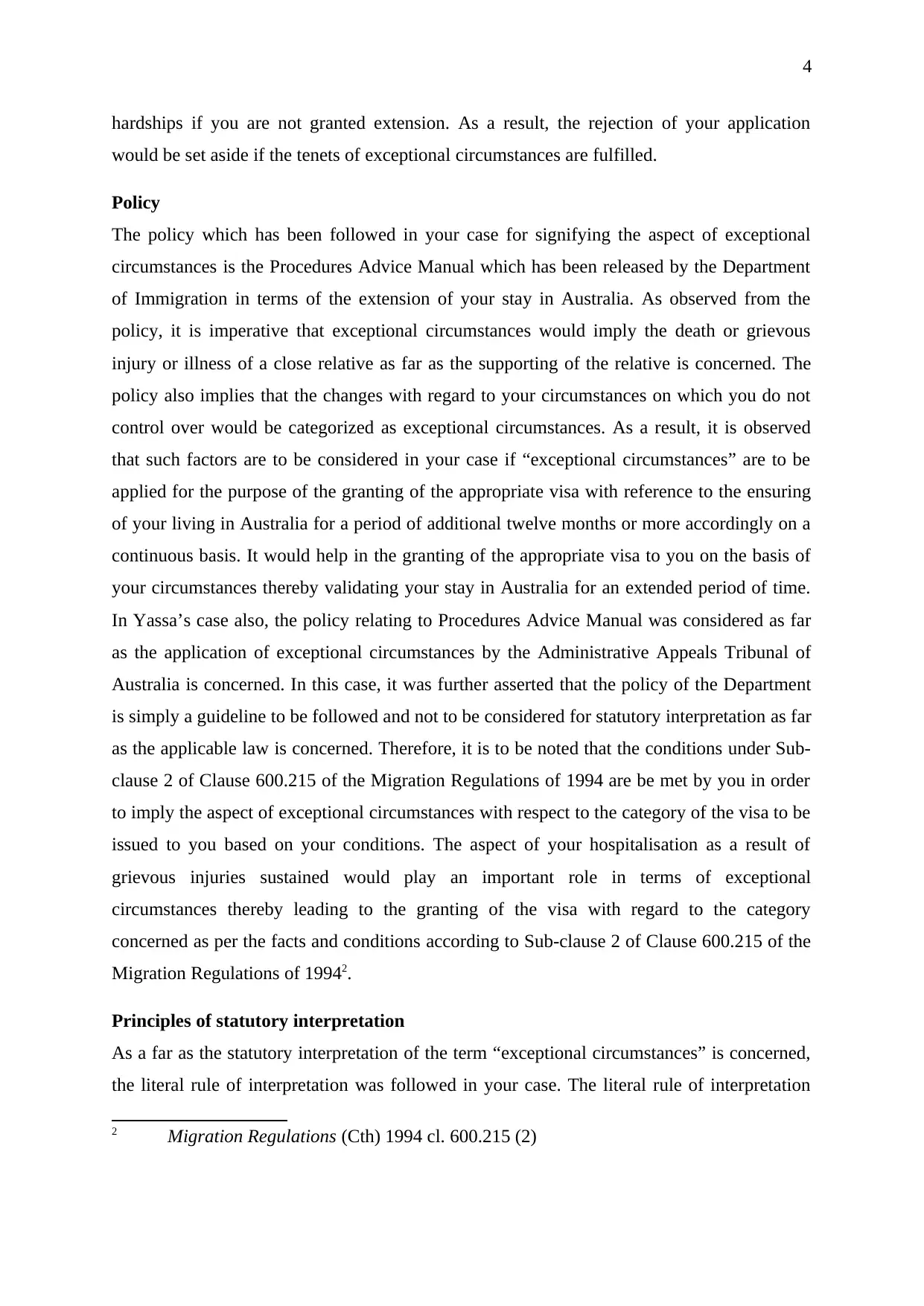
4
hardships if you are not granted extension. As a result, the rejection of your application
would be set aside if the tenets of exceptional circumstances are fulfilled.
Policy
The policy which has been followed in your case for signifying the aspect of exceptional
circumstances is the Procedures Advice Manual which has been released by the Department
of Immigration in terms of the extension of your stay in Australia. As observed from the
policy, it is imperative that exceptional circumstances would imply the death or grievous
injury or illness of a close relative as far as the supporting of the relative is concerned. The
policy also implies that the changes with regard to your circumstances on which you do not
control over would be categorized as exceptional circumstances. As a result, it is observed
that such factors are to be considered in your case if “exceptional circumstances” are to be
applied for the purpose of the granting of the appropriate visa with reference to the ensuring
of your living in Australia for a period of additional twelve months or more accordingly on a
continuous basis. It would help in the granting of the appropriate visa to you on the basis of
your circumstances thereby validating your stay in Australia for an extended period of time.
In Yassa’s case also, the policy relating to Procedures Advice Manual was considered as far
as the application of exceptional circumstances by the Administrative Appeals Tribunal of
Australia is concerned. In this case, it was further asserted that the policy of the Department
is simply a guideline to be followed and not to be considered for statutory interpretation as far
as the applicable law is concerned. Therefore, it is to be noted that the conditions under Sub-
clause 2 of Clause 600.215 of the Migration Regulations of 1994 are be met by you in order
to imply the aspect of exceptional circumstances with respect to the category of the visa to be
issued to you based on your conditions. The aspect of your hospitalisation as a result of
grievous injuries sustained would play an important role in terms of exceptional
circumstances thereby leading to the granting of the visa with regard to the category
concerned as per the facts and conditions according to Sub-clause 2 of Clause 600.215 of the
Migration Regulations of 19942.
Principles of statutory interpretation
As a far as the statutory interpretation of the term “exceptional circumstances” is concerned,
the literal rule of interpretation was followed in your case. The literal rule of interpretation
2 Migration Regulations (Cth) 1994 cl. 600.215 (2)
hardships if you are not granted extension. As a result, the rejection of your application
would be set aside if the tenets of exceptional circumstances are fulfilled.
Policy
The policy which has been followed in your case for signifying the aspect of exceptional
circumstances is the Procedures Advice Manual which has been released by the Department
of Immigration in terms of the extension of your stay in Australia. As observed from the
policy, it is imperative that exceptional circumstances would imply the death or grievous
injury or illness of a close relative as far as the supporting of the relative is concerned. The
policy also implies that the changes with regard to your circumstances on which you do not
control over would be categorized as exceptional circumstances. As a result, it is observed
that such factors are to be considered in your case if “exceptional circumstances” are to be
applied for the purpose of the granting of the appropriate visa with reference to the ensuring
of your living in Australia for a period of additional twelve months or more accordingly on a
continuous basis. It would help in the granting of the appropriate visa to you on the basis of
your circumstances thereby validating your stay in Australia for an extended period of time.
In Yassa’s case also, the policy relating to Procedures Advice Manual was considered as far
as the application of exceptional circumstances by the Administrative Appeals Tribunal of
Australia is concerned. In this case, it was further asserted that the policy of the Department
is simply a guideline to be followed and not to be considered for statutory interpretation as far
as the applicable law is concerned. Therefore, it is to be noted that the conditions under Sub-
clause 2 of Clause 600.215 of the Migration Regulations of 1994 are be met by you in order
to imply the aspect of exceptional circumstances with respect to the category of the visa to be
issued to you based on your conditions. The aspect of your hospitalisation as a result of
grievous injuries sustained would play an important role in terms of exceptional
circumstances thereby leading to the granting of the visa with regard to the category
concerned as per the facts and conditions according to Sub-clause 2 of Clause 600.215 of the
Migration Regulations of 19942.
Principles of statutory interpretation
As a far as the statutory interpretation of the term “exceptional circumstances” is concerned,
the literal rule of interpretation was followed in your case. The literal rule of interpretation
2 Migration Regulations (Cth) 1994 cl. 600.215 (2)
Paraphrase This Document
Need a fresh take? Get an instant paraphrase of this document with our AI Paraphraser
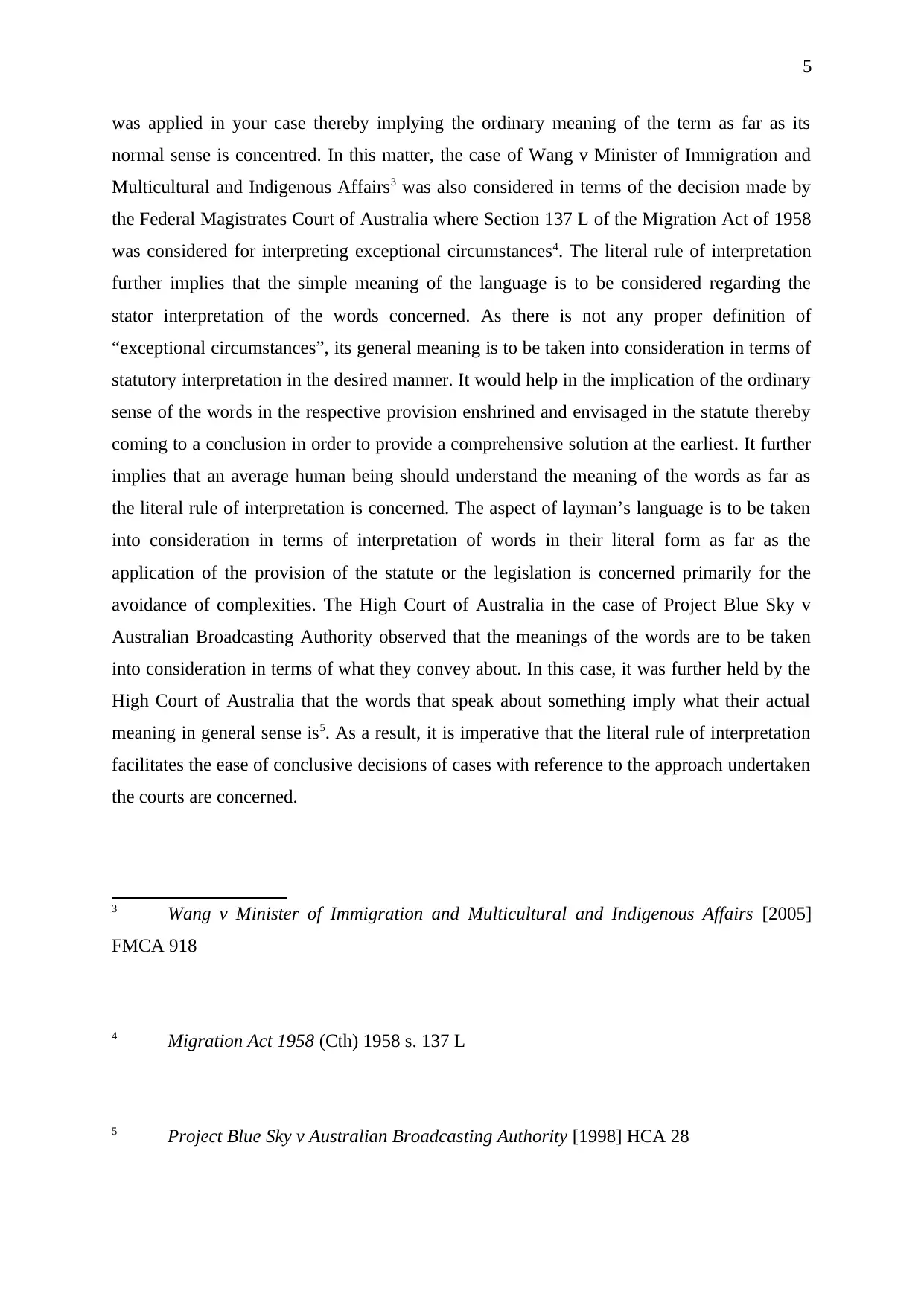
5
was applied in your case thereby implying the ordinary meaning of the term as far as its
normal sense is concentred. In this matter, the case of Wang v Minister of Immigration and
Multicultural and Indigenous Affairs3 was also considered in terms of the decision made by
the Federal Magistrates Court of Australia where Section 137 L of the Migration Act of 1958
was considered for interpreting exceptional circumstances4. The literal rule of interpretation
further implies that the simple meaning of the language is to be considered regarding the
stator interpretation of the words concerned. As there is not any proper definition of
“exceptional circumstances”, its general meaning is to be taken into consideration in terms of
statutory interpretation in the desired manner. It would help in the implication of the ordinary
sense of the words in the respective provision enshrined and envisaged in the statute thereby
coming to a conclusion in order to provide a comprehensive solution at the earliest. It further
implies that an average human being should understand the meaning of the words as far as
the literal rule of interpretation is concerned. The aspect of layman’s language is to be taken
into consideration in terms of interpretation of words in their literal form as far as the
application of the provision of the statute or the legislation is concerned primarily for the
avoidance of complexities. The High Court of Australia in the case of Project Blue Sky v
Australian Broadcasting Authority observed that the meanings of the words are to be taken
into consideration in terms of what they convey about. In this case, it was further held by the
High Court of Australia that the words that speak about something imply what their actual
meaning in general sense is5. As a result, it is imperative that the literal rule of interpretation
facilitates the ease of conclusive decisions of cases with reference to the approach undertaken
the courts are concerned.
3 Wang v Minister of Immigration and Multicultural and Indigenous Affairs [2005]
FMCA 918
4 Migration Act 1958 (Cth) 1958 s. 137 L
5 Project Blue Sky v Australian Broadcasting Authority [1998] HCA 28
was applied in your case thereby implying the ordinary meaning of the term as far as its
normal sense is concentred. In this matter, the case of Wang v Minister of Immigration and
Multicultural and Indigenous Affairs3 was also considered in terms of the decision made by
the Federal Magistrates Court of Australia where Section 137 L of the Migration Act of 1958
was considered for interpreting exceptional circumstances4. The literal rule of interpretation
further implies that the simple meaning of the language is to be considered regarding the
stator interpretation of the words concerned. As there is not any proper definition of
“exceptional circumstances”, its general meaning is to be taken into consideration in terms of
statutory interpretation in the desired manner. It would help in the implication of the ordinary
sense of the words in the respective provision enshrined and envisaged in the statute thereby
coming to a conclusion in order to provide a comprehensive solution at the earliest. It further
implies that an average human being should understand the meaning of the words as far as
the literal rule of interpretation is concerned. The aspect of layman’s language is to be taken
into consideration in terms of interpretation of words in their literal form as far as the
application of the provision of the statute or the legislation is concerned primarily for the
avoidance of complexities. The High Court of Australia in the case of Project Blue Sky v
Australian Broadcasting Authority observed that the meanings of the words are to be taken
into consideration in terms of what they convey about. In this case, it was further held by the
High Court of Australia that the words that speak about something imply what their actual
meaning in general sense is5. As a result, it is imperative that the literal rule of interpretation
facilitates the ease of conclusive decisions of cases with reference to the approach undertaken
the courts are concerned.
3 Wang v Minister of Immigration and Multicultural and Indigenous Affairs [2005]
FMCA 918
4 Migration Act 1958 (Cth) 1958 s. 137 L
5 Project Blue Sky v Australian Broadcasting Authority [1998] HCA 28
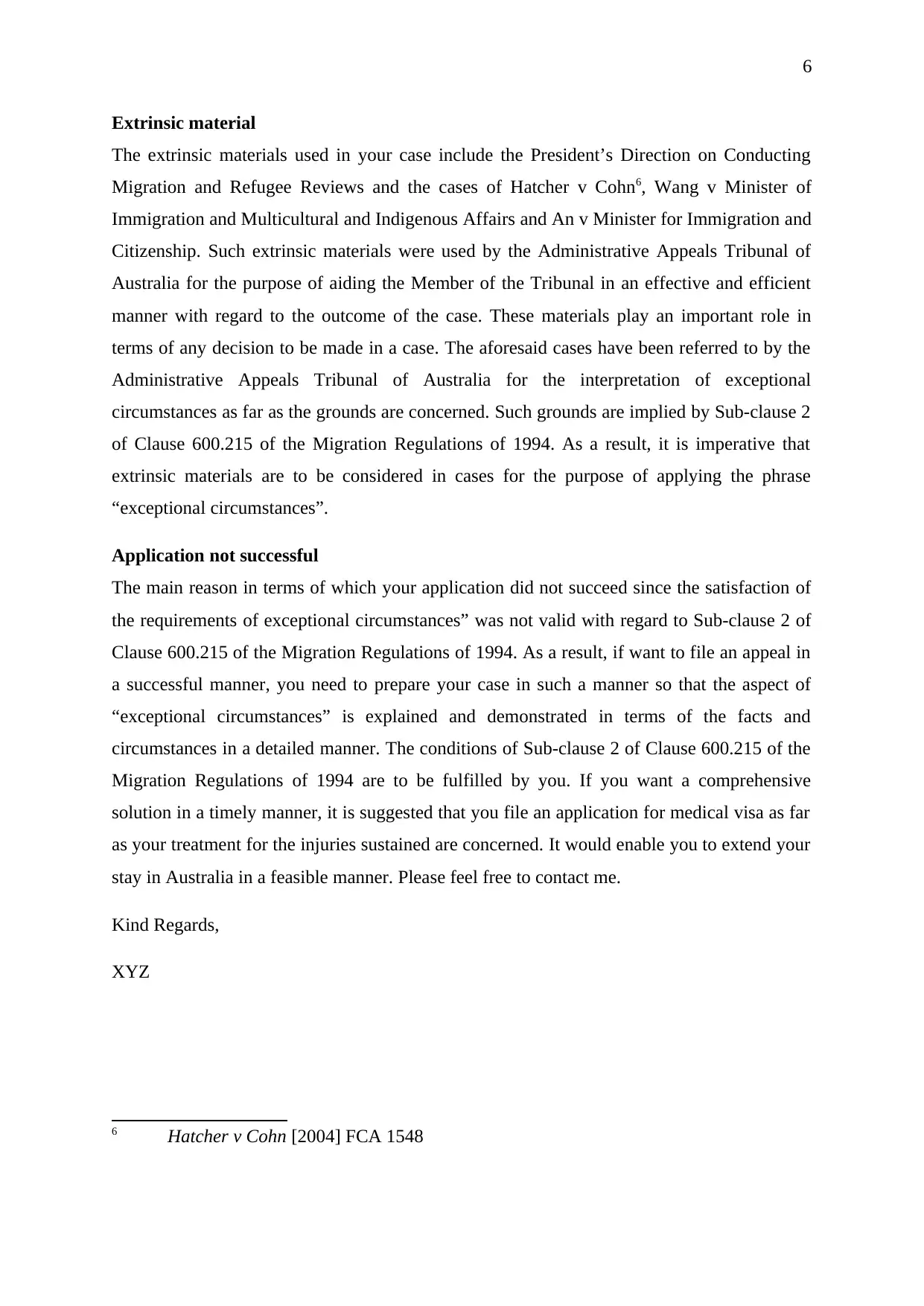
6
Extrinsic material
The extrinsic materials used in your case include the President’s Direction on Conducting
Migration and Refugee Reviews and the cases of Hatcher v Cohn6, Wang v Minister of
Immigration and Multicultural and Indigenous Affairs and An v Minister for Immigration and
Citizenship. Such extrinsic materials were used by the Administrative Appeals Tribunal of
Australia for the purpose of aiding the Member of the Tribunal in an effective and efficient
manner with regard to the outcome of the case. These materials play an important role in
terms of any decision to be made in a case. The aforesaid cases have been referred to by the
Administrative Appeals Tribunal of Australia for the interpretation of exceptional
circumstances as far as the grounds are concerned. Such grounds are implied by Sub-clause 2
of Clause 600.215 of the Migration Regulations of 1994. As a result, it is imperative that
extrinsic materials are to be considered in cases for the purpose of applying the phrase
“exceptional circumstances”.
Application not successful
The main reason in terms of which your application did not succeed since the satisfaction of
the requirements of exceptional circumstances” was not valid with regard to Sub-clause 2 of
Clause 600.215 of the Migration Regulations of 1994. As a result, if want to file an appeal in
a successful manner, you need to prepare your case in such a manner so that the aspect of
“exceptional circumstances” is explained and demonstrated in terms of the facts and
circumstances in a detailed manner. The conditions of Sub-clause 2 of Clause 600.215 of the
Migration Regulations of 1994 are to be fulfilled by you. If you want a comprehensive
solution in a timely manner, it is suggested that you file an application for medical visa as far
as your treatment for the injuries sustained are concerned. It would enable you to extend your
stay in Australia in a feasible manner. Please feel free to contact me.
Kind Regards,
XYZ
6 Hatcher v Cohn [2004] FCA 1548
Extrinsic material
The extrinsic materials used in your case include the President’s Direction on Conducting
Migration and Refugee Reviews and the cases of Hatcher v Cohn6, Wang v Minister of
Immigration and Multicultural and Indigenous Affairs and An v Minister for Immigration and
Citizenship. Such extrinsic materials were used by the Administrative Appeals Tribunal of
Australia for the purpose of aiding the Member of the Tribunal in an effective and efficient
manner with regard to the outcome of the case. These materials play an important role in
terms of any decision to be made in a case. The aforesaid cases have been referred to by the
Administrative Appeals Tribunal of Australia for the interpretation of exceptional
circumstances as far as the grounds are concerned. Such grounds are implied by Sub-clause 2
of Clause 600.215 of the Migration Regulations of 1994. As a result, it is imperative that
extrinsic materials are to be considered in cases for the purpose of applying the phrase
“exceptional circumstances”.
Application not successful
The main reason in terms of which your application did not succeed since the satisfaction of
the requirements of exceptional circumstances” was not valid with regard to Sub-clause 2 of
Clause 600.215 of the Migration Regulations of 1994. As a result, if want to file an appeal in
a successful manner, you need to prepare your case in such a manner so that the aspect of
“exceptional circumstances” is explained and demonstrated in terms of the facts and
circumstances in a detailed manner. The conditions of Sub-clause 2 of Clause 600.215 of the
Migration Regulations of 1994 are to be fulfilled by you. If you want a comprehensive
solution in a timely manner, it is suggested that you file an application for medical visa as far
as your treatment for the injuries sustained are concerned. It would enable you to extend your
stay in Australia in a feasible manner. Please feel free to contact me.
Kind Regards,
XYZ
6 Hatcher v Cohn [2004] FCA 1548
⊘ This is a preview!⊘
Do you want full access?
Subscribe today to unlock all pages.

Trusted by 1+ million students worldwide
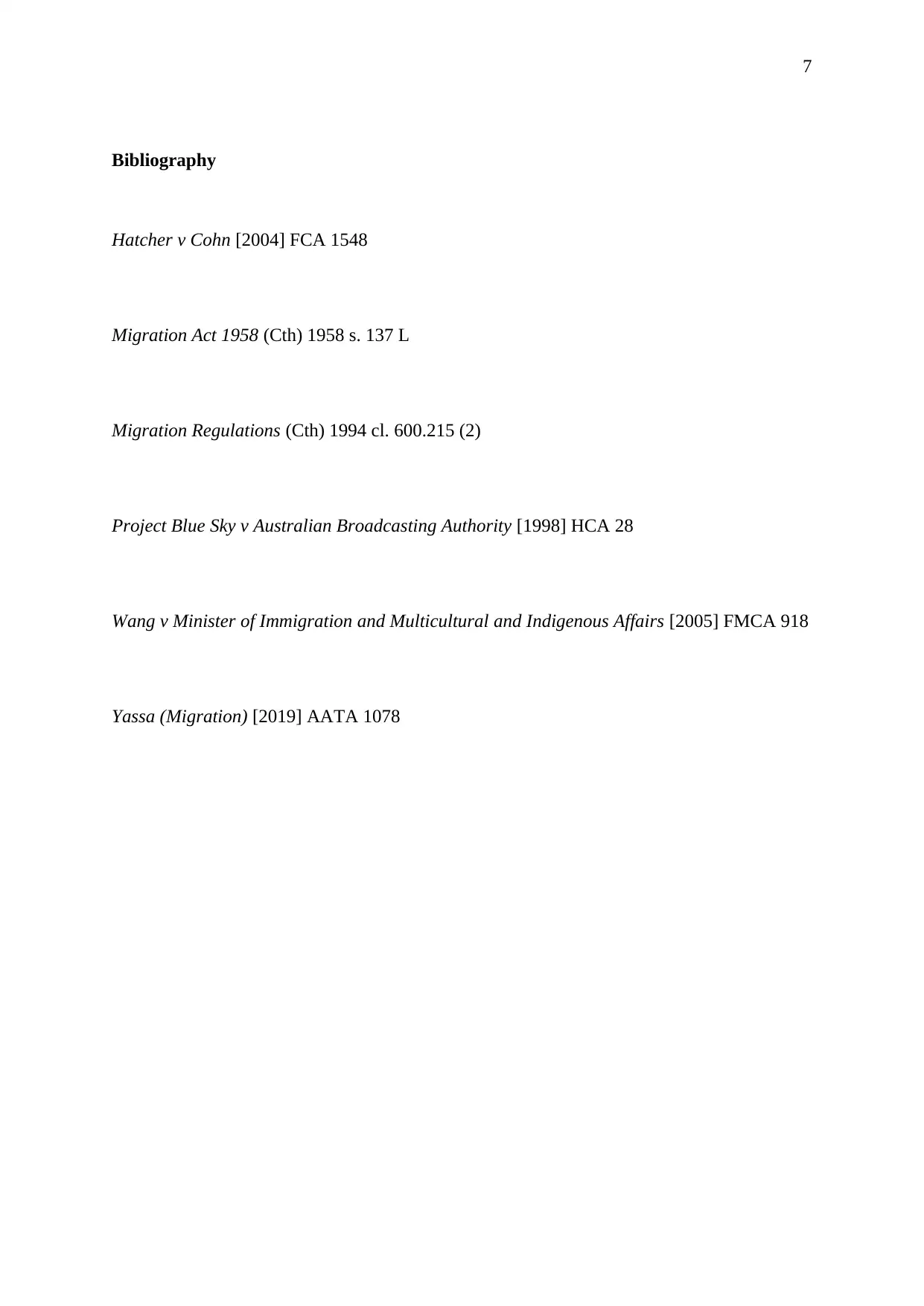
7
Bibliography
Hatcher v Cohn [2004] FCA 1548
Migration Act 1958 (Cth) 1958 s. 137 L
Migration Regulations (Cth) 1994 cl. 600.215 (2)
Project Blue Sky v Australian Broadcasting Authority [1998] HCA 28
Wang v Minister of Immigration and Multicultural and Indigenous Affairs [2005] FMCA 918
Yassa (Migration) [2019] AATA 1078
Bibliography
Hatcher v Cohn [2004] FCA 1548
Migration Act 1958 (Cth) 1958 s. 137 L
Migration Regulations (Cth) 1994 cl. 600.215 (2)
Project Blue Sky v Australian Broadcasting Authority [1998] HCA 28
Wang v Minister of Immigration and Multicultural and Indigenous Affairs [2005] FMCA 918
Yassa (Migration) [2019] AATA 1078
1 out of 7
Related Documents
Your All-in-One AI-Powered Toolkit for Academic Success.
+13062052269
info@desklib.com
Available 24*7 on WhatsApp / Email
![[object Object]](/_next/static/media/star-bottom.7253800d.svg)
Unlock your academic potential
Copyright © 2020–2026 A2Z Services. All Rights Reserved. Developed and managed by ZUCOL.




![Implications of Le v Minister for Immigration [2019] FCCA 2167](/_next/image/?url=https%3A%2F%2Fdesklib.com%2Fmedia%2Fimages%2Fyq%2F3867d1a1ba4b437ba61ecfd169b6d5a2.jpg&w=256&q=75)
